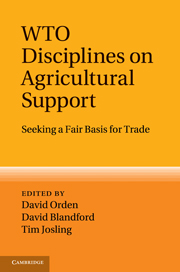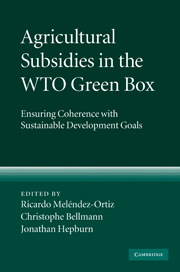WTO Disciplines on Agricultural Support
Farm support is contentious in international negotiations. This in-depth assessment of the legal compliance and economic evaluation issues raised by the WTO Agreement on Agriculture presents consistent support data and forward-looking projections for eight developed and developing countries (EU, US, Japan, Norway, Brazil, China, India, Philippines), using original estimates where official notifications are not available. Variations over time in notified support in some cases reflect real policy changes; others merely reflect shifts in how countries represent their measures. The stalled Doha negotiations presage significantly tighter constraints for developed countries that provide the highest support, but loopholes will persist. Developing countries face fewer constraints and their trade-distorting farm support can rise. Pressure points and key remaining issues if a Doha agreement is reached are evaluated. Vigilant monitoring for compliance of farm support with WTO commitments will be required to lessen its negative consequences whether or not the Doha Round is concluded.
- Provides a systematic and standard reference that highlights and clarifies the intricacies of farm subsidies, and the interrelated but distinct legal and economic issues raised when agricultural support is evaluated under the WTO agreement
- Detailed empirical analysis for eight major countries brings to life the generally applicable principles, with each chapter serving as a resource for policy deliberations related to that specific country
- Projects farm support for the next 6–8 years and identifies pressure points under the prospective WTO Doha disciplines on domestic support in agriculture
Reviews & endorsements
"Governments, non-governmental organisations, researchers and journalists
need measures to compare the levels and types of support to agriculture across
countries. All these working professionals should find this book extremely
useful, and I wholeheartedly recommend it to colleagues and students."
Luca Salvatici, European Review of Agricultural Economics
"At its core, this book makes a compelling argument for the value of transparency … By reading this book, students, researchers, and policy practitioners will gain a deeper appreciation of the role of transparency and will be more sophisticated consumers of WTO notified information in the future."
World Trade Review
Product details
June 2014Paperback
9781107417106
520 pages
229 × 152 × 27 mm
0.69kg
35 b/w illus. 89 tables
Available
Table of Contents
- Part I. Overview of Domestic Support Issues and WTO Rules:
- 1. Introduction David Orden, David Blandford and Tim Josling
- 2. The WTO disciplines on domestic support Lars Brink
- Part II. Developed Countries: Have High Levels of Support Come Down?:
- 3. European Union Tim Josling and Alan Swinbank
- 4. United States David Blandford and David Orden
- 5. Japan Yoshihisa Godo and Daisuke Takahashi
- 6. Norway Ivar Gaasland, Roberto Garcia and Erling Vardal
- Part III. Developing Countries: Will Low Levels of Support Rise?:
- 7. Brazil Andre Nassar
- 8. India Munisamy Gopinath
- 9. China Fuzhi Cheng
- 10. Philippines Caesar B. Cororaton
- Part IV. Looking Forward: Can Fair Markets Be Achieved?:
- 11. The difficult task of disciplining domestic support David Orden, David Blandford and Tim Josling
- Appendix A. Domestic support provisions of the Agreement on Agriculture
- Appendix B. Domestic support provisions of the Doha draft modalities.




